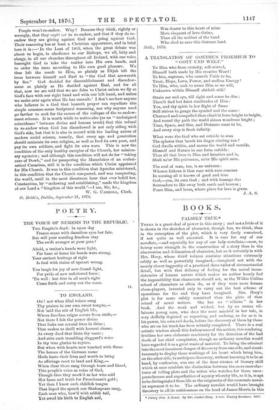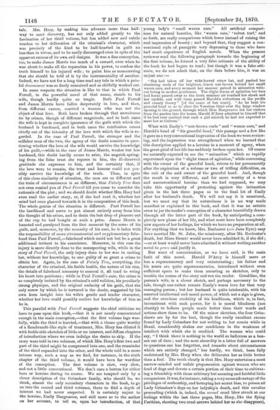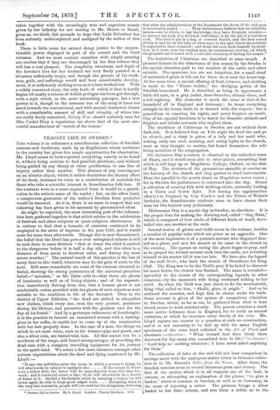BOOKS.
FALSELY TRUE.*
THERE is a great deal of power in this story ; and not a little of it is shown in the sketches of character, though less, we think, than
in the conception of the plot, which is very finely conceived, if not quite as well executed. It is rare for any of our novelists,—and especially for any of our lady-novelists,—now, to betray more strength in the construction of a story than in the observation and delineation of character, but so it certainly is with Mrs. Hoey, whose third volume contains situations extremely subtly as well as powerfully imagined,—imagined not with the merely clever ingenuity of a practised dove-taller of circumstantial detail, but with that delicacy of feeling for the moral incon- sistencies of human nature which makes an author keenly feel the impossibility that characters should act, as the Wilkie Collins school of characters so often do, as if they were mere human chess-players, invented only to carry out the best scheme of operations for the end they have imagined. Mrs. Hoey's plot is far more subtly conceived than the plots of that school of novel writers. She has no " villains " in her book. And the weak and wicked, but by no means vil- lainous young man, who does the most mischief in her tale, is very skilfully depicted as repenting, and undoing, as far as is in his power, his own evil deeds, before the discovery of them by those who are on his track has been actually completed. There is a real artistic wisdom about this forbearance of the author, this rendering fruitless her own elaborate machinery for the detection of the bad deeds of her chief conspirator, though an ordinary novelist would have regarded it as a great waste of material. To bring the criminal into the most imminent danger of discovery from one side, and simul- taneously to display those workings of his heart which bring him, on the other side, to anticipate discovery, without knowing it to be at hand, by confession, was one of the finer strokes of literary skill which at once establish the distinction between the mere manufac- turer of telling plots and the writer who watches for those unex- pectednesses and superfluities of agency whereby life, as it is, is apt to be distinguished from life as the exigencies of the economic novel- ist represent it to be. The ordinary novelist would have brought discovery in all its ruthlessness on the head of James Morris in this
4, Falsely True. A NateL By Mrs. Cashel Nosy. 3 4018. Tinsley Brothers. 18701
tale. Mrs. Hoey, by making him advance more than half- way to meet discovery, has not only added greatly to the fascination of her third volume, but has added new and subtle touches to her delineation of the criminal's character, which was precisely of the kind to be half-hearted in guilt no less than in virtue, and to be easily discouraged even in spite of the apparent success of its own evil designs. It was a fine conception, too, to make James Morris too much of a coward, even when he was about to make all the reparation in his power, to confess the truth himself to his injured wife ; to paint him as manceuvring that she should be told of it by the instrumentality of another. Indeed, we have not for a long time read any tale in which a pain- ful denouement was so finely conceived and so skilfully worked out.
In some respects the situation is like to that in which Paul Ferroll, in the powerful novel of that name, stands to his wife, though hardly quite so tragic. Both Paul Ferroll and James Morris have fallen desperately in love, and then, from different causes, married a woman who was not the object of that love. Both have broken through that unwelcome tie by crimes, though of different magnitude, and in both cases the wife is kept in complete ignorance of the guilt with which the husband is burdened, and in both cases the retribution comes chiefly out of the intensity of the love with which the wife is re- garded. In the case of Paul Ferroll, the stronger and the selfisher man of the two, the agony of the doubt consists in ques- tioning whether the love of the wife would survive the knowledge of his guilt,—while in the case of James Morris, weaker but less hardened, this doubt hardly seems to arise, the anguish spring- ing from the false trust she reposes in him, the ill-deserved gratitude she expresses to him, and the certainty that, if the love were to remain, the trust and honour could not pos- sibly survive the knowledge of the truth. Thus, in spite of this close similarity of situation, the men are so different and the train of circumstances is so different, that Falsely True does not even remind you of Paul Ferroll till you come to consider the rationale of the plot ; and we should doubt whether Mrs. Hoey had even read the earlier story, or, if she had read it, whether her mind had once glanced towards it in the composition of this book. The whole genius of the situation is different. Paul Ferroll has the hardihood and nerve to put almost entirely away from him the thought of his crime, and to drain the last drop of pleasure out of the cup he had bought at such a price. James Morris is haunted and paralyzed from the first moment by the sense of his guilt, and, moreover, by the necessity of his case, he is laden with the responsibility of more circumstantial and supplementary false- hood than Paul Ferroll,—falsehood which could not but be a great additional irritant to his conscience. Moreover, in this case the injury is more directly done to the unsuspecting wife, while in the story of Paul Ferroll, the only injury done to her was in uniting her, without her knowledge, to one guilty of so great a crime to obtain her. Again, in the case of Falsely True, everything, the character of the criminal, his feeble health, the nature of his sins, the details of falsehood necessary to conceal it, all tend to wring his heart into penitence ; while in Paul Ferroll's case, the crime is so completely isolated by the criminal's cold volition, his peculiarly strong physique, and the original audacity of his guilt, that the only screw by which he is tortured is the doubt, suggested by his own keen insight iuto his wife's gentle and tender character, whether her love could possibly outlive her knowledge of him as he is.
This parallel with Paul Ferroll suggests the chief criticism we have to pass upon this book,—that it is not nearly concentrated enough in the main conception,—that the first volume lags woe- fully, while the third is hurried,—that with a theme quite worthy of a Rembrandt-like style of treatment, Mrs. Hoey has diluted it with feeble side-sketches of little or no interest, and diffuse chapters of introduction where we even indulge the desire to skip. If the story were told in two volumes, of which Mrs. Hoey's first two and part of the third might be compressed into one, and the remainder of the third expanded into the other, and the whole told in a more intense way, such a way as we find, for instance, in the sixth chapter of the third volume, it would have been far worthier of the conception. The first volume is slow, very slow, and not a little conventional. We don't care a button for either hero or heroine during its course. We are tempted only by a clever description of the Grimshaw family, who should be, we think, almost the only secondary characters in the book, to go on into the second and third volumes, there to find a depth of interest we had never suspected. It is certainly unjust to the heroine, Emily Hargreaves, and still more so to the author on her account, to tell us, upon her introduction, of that
young lady's "small waxen ears." All artificial compari- sons for natural beauties, like 'waxen ears," velvet turf,' and so forth, are really comparisons which lower instead of raising the real impression of beauty ; and beyond that, they suggest a con- ventional style of panegyric very depressing to those who have had much experience of English novels. When the present reviewer read the following paragraph towards the beginning of the first volume, he formed a very false estimate of the ability of the book he had begun to read ; but though it was a false esti- mate, we do not admit that, on the data before him, it was an unjust one :—
" She had taken off her wide-leaved straw hat, and pushed her clustering curls of the brightest, truest nut-brown behind her small waxen ears, and every moment her manner gained in animation with- out losing in modest gentleness. The slight traces of agitation her face had borne passed away as the fresh summer air touched her cheek and her eyelids, and with them passed Harold's reflections on the poodle and canary theory" [of the cause of her tears]. "As he bent his graceful head so as to clear the Venetian blind over the large window opening to the ground, through which Miss Hargreaves led her visitors from the garden into the house, Harold D'Arey admitted to himself that if he had ever realized that such a girl existed, he had not expected to meet her at Culvers."
What with Emily's "nut-brown curls" and "waxen ears," and Harold's bend of "his graceful head," this passage and a few like it gave us a very conventional impression of the book we were review- ing, and the impression was strengthened when we learned that this description applied to a heroine in a moment of agony, when the great grief of her life has suddenly broken upon her. Of course we naturally expected to see the "animation" which so rapidly supervened upon the "slight traces of agitation," while conversing with the owner of the graceful head, return to her permanently after the expiration of a volume or two of trifling difficulties, on the suit of the said owner of the graceful head. And, though the result is very different, and far more worthy of a true and unconventional heroine than we had supposed, we may take this opportunity of protesting against the intimation given in the last three pages as to the final lot of Emily after her husband's death. We will not say it is unnatural, but we must say that its naturalness is in no way made manifest or explained in this book, and that it was an artistic error to jar the reader's conception of a character beautifully drawn through all the latter part of the book, by anticipating a com- pletely new phase of her life, and what must have been completely new aspects of her feelings, for which we have no preparation at all. For anything that we know, Mrs. Rochester (nee Jane Eyre) may have married Mr. St. John, the missionary, after Mr. Rochester's death, but Misss Bronto would never have admitted it, if she did ; —or at least would never have admitted it without writing another novel to prove and justify it.
But want of concentration, as we have said, is the main fault of this novel. Harold D'Arey is himself more or less a supernumerary and very uninteresting ; his father and his aunts are quite supernumeraries, introduced without even sufficient space to make them amustiug as sketches, only to trouble the course of the story and vex the reader. Geraldine, the parson's wife, is a clever sketch, and perhaps necessary to the tale, though one rather resents Emily's warm love for that very managing person ; but her husband is quite intolerable, with his asserted intellectual and moral power, of which not a sign is given, and the overdone credulity of his kindliness, which is, in fact, inconsistent with such power, for it is moral blindness (not charity) to believe people much better than their words and actions show them to be. Of the minor sketches, the four Grim- shaws are by far the best, though the really excellent excuse found by Lady Grimshaw for not writing to her cousin while in
Brazil, considerably shakes our confidence in the weakness of intellect with which she is credited. The woman who could say, "I think there is nothing in the world so ludicrous as a bon- net out of date ; and the next absurdity is a letter full of answers to questions one has forgotten, and remarks about circumstances which are entirely changed," has hardly, we think, been fully understood by Mrs. Hoey when she delineates her as little better than a fool. The truth clearly is that Mrs. Hoey entertains a most narrow-minded and unfair prepossession against women who are fond of dogs and devote a certain portion of their time to cultivat- ing a friendship with those arbitrary but amusing and faithful little companions. It was, for instance, taking a verymean advantage of the privileges of authorship, and betraying her secret bias, to poison all Lady Grimahaw's dogs on her ladyship's death, and this cavalier proceeding (which is, indeed, the second cruel blow struck at our feelings within the last three pages, Mrs. Hoey, like the flying Parthian, shooting two cruel arrows behind her as she disappears),
taken together with the exceedingly wise and sagacious reason given by her ladyship for not writing to Mr. Morris in Brazil, gives us, we think, fair grounds to hope that Lady Grimshaw has been seriously misinterpreted and maligned by the author of this book.
There is little room for extract doing justice to the unques- tionable power displayed in part of the second and the third volumes. And we must content ourselves with simply assuring our readers that if they are discouraged by the first volume they will lose a real pleasure. The simplicity, sweetness, and depth of the heroine's love for her husband are very finely painted in a situation sufficiently tragic, and though the picture of his weak- ness, guilt, and sufferings would well bear considerable develop- ment, it is sufficiently striking even as it is here worked out. With a subtly conceived story, the only fault of which is that it hardly begins till nearly a volume of dullish prologue has been got through, with a style which, in the more interesting passages, has a true poetry in it, though in the common run of the story it leans too much towards the conventional, and with several characters drawn with a considerable amount of skill and vivacity, of whom two are really finely conceived, Falsely True should certainly earn for Mrs. Cashel Hoey a reputation far above that of the most suc- cessful manufacturer of novels of the season.'
































 Previous page
Previous page